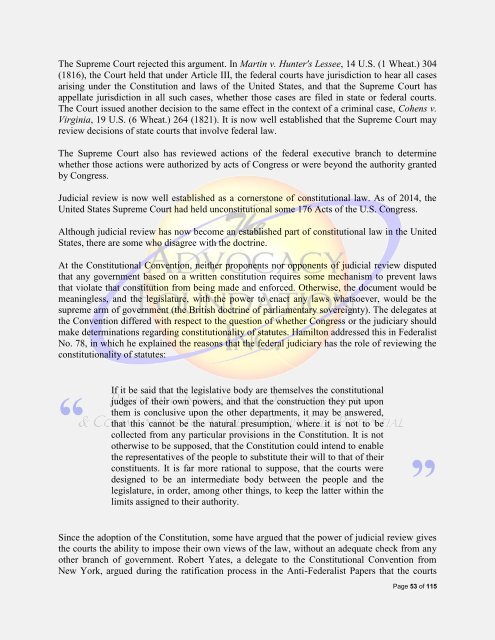Judicial ReEngineering
Judicial ReEngineering
Judicial ReEngineering
You also want an ePaper? Increase the reach of your titles
YUMPU automatically turns print PDFs into web optimized ePapers that Google loves.
The Supreme Court rejected this argument. In Martin v. Hunter's Lessee, 14 U.S. (1 Wheat.) 304<br />
(1816), the Court held that under Article III, the federal courts have jurisdiction to hear all cases<br />
arising under the Constitution and laws of the United States, and that the Supreme Court has<br />
appellate jurisdiction in all such cases, whether those cases are filed in state or federal courts.<br />
The Court issued another decision to the same effect in the context of a criminal case, Cohens v.<br />
Virginia, 19 U.S. (6 Wheat.) 264 (1821). It is now well established that the Supreme Court may<br />
review decisions of state courts that involve federal law.<br />
The Supreme Court also has reviewed actions of the federal executive branch to determine<br />
whether those actions were authorized by acts of Congress or were beyond the authority granted<br />
by Congress.<br />
<strong>Judicial</strong> review is now well established as a cornerstone of constitutional law. As of 2014, the<br />
United States Supreme Court had held unconstitutional some 176 Acts of the U.S. Congress.<br />
Although judicial review has now become an established part of constitutional law in the United<br />
States, there are some who disagree with the doctrine.<br />
At the Constitutional Convention, neither proponents nor opponents of judicial review disputed<br />
that any government based on a written constitution requires some mechanism to prevent laws<br />
that violate that constitution from being made and enforced. Otherwise, the document would be<br />
meaningless, and the legislature, with the power to enact any laws whatsoever, would be the<br />
supreme arm of government (the British doctrine of parliamentary sovereignty). The delegates at<br />
the Convention differed with respect to the question of whether Congress or the judiciary should<br />
make determinations regarding constitutionality of statutes. Hamilton addressed this in Federalist<br />
No. 78, in which he explained the reasons that the federal judiciary has the role of reviewing the<br />
constitutionality of statutes:<br />
“<br />
If<br />
it be said that the legislative body are themselves the constitutional<br />
judges of their own powers, and that the construction they put upon<br />
them is conclusive upon the other departments, it may be answered,<br />
that this cannot be the natural presumption, where it is not to be<br />
collected from any particular provisions in the Constitution. It is not<br />
otherwise to be supposed, that the Constitution could intend to enable<br />
the representatives of the people to substitute their will to that of their<br />
constituents. It is far more rational to suppose, that the courts were<br />
designed to be an intermediate body between the people and the<br />
legislature, in order, among other things, to keep the latter within the<br />
limits assigned to their authority.<br />
”<br />
Since the adoption of the Constitution, some have argued that the power of judicial review gives<br />
the courts the ability to impose their own views of the law, without an adequate check from any<br />
other branch of government. Robert Yates, a delegate to the Constitutional Convention from<br />
New York, argued during the ratification process in the Anti-Federalist Papers that the courts<br />
Page 53 of 115

















